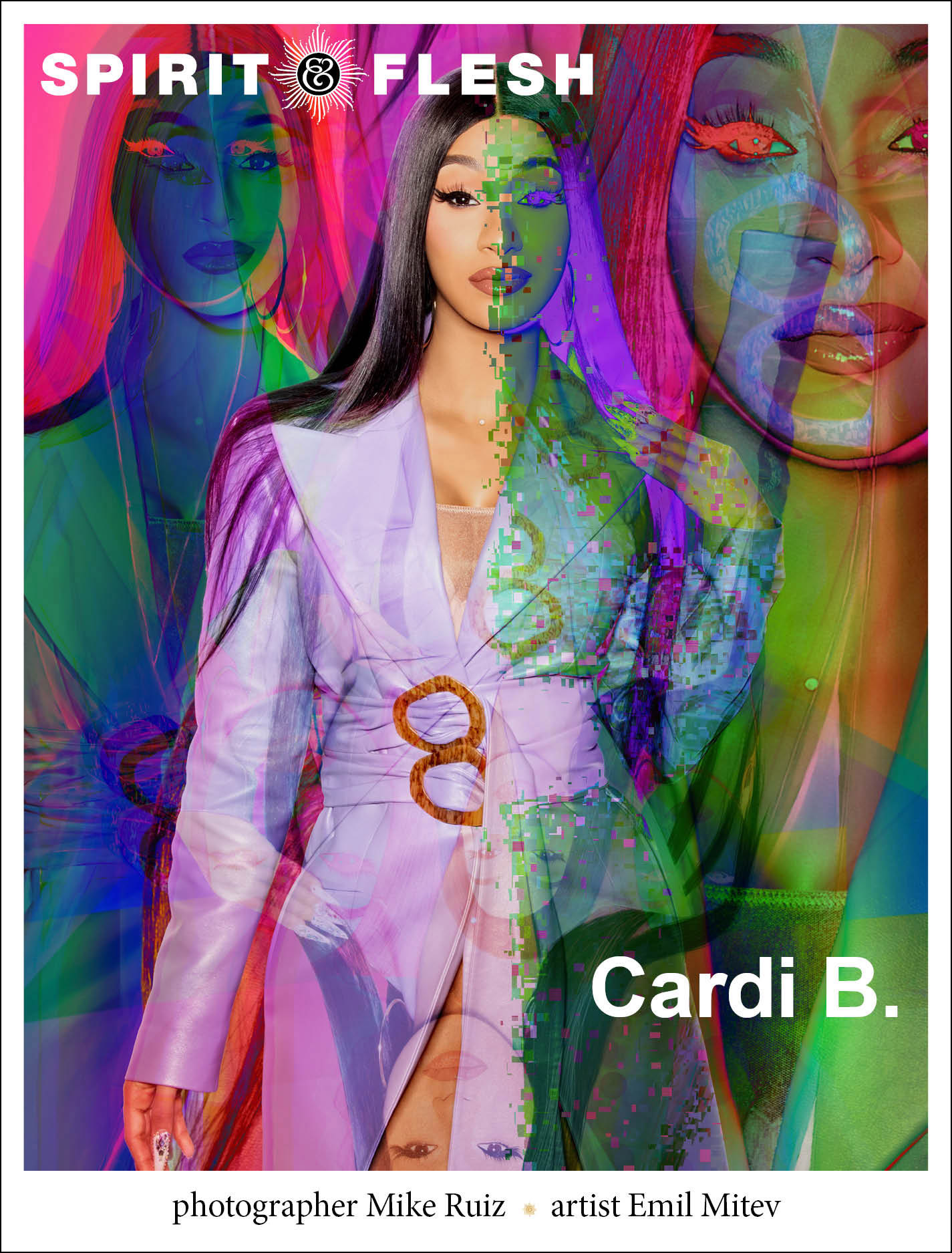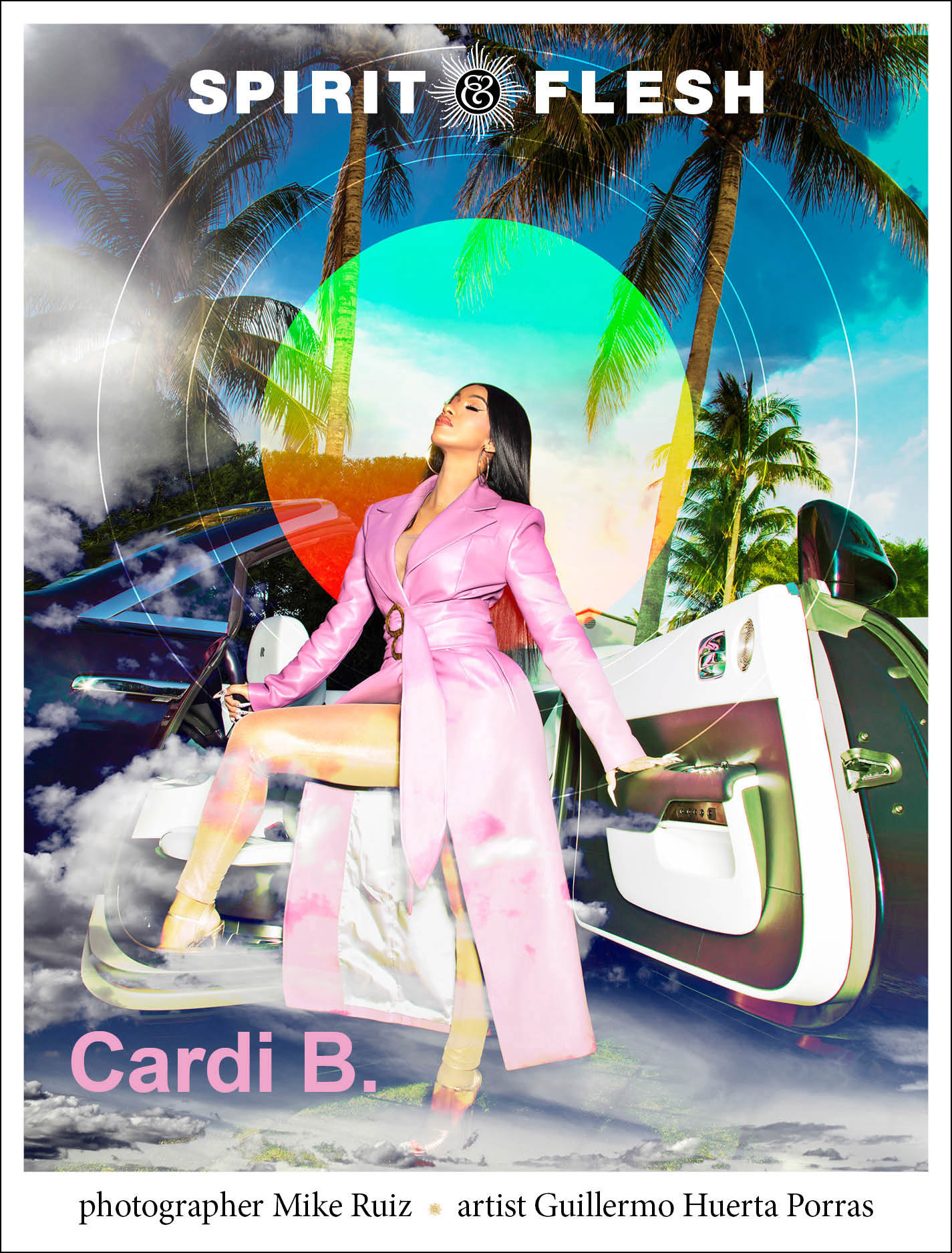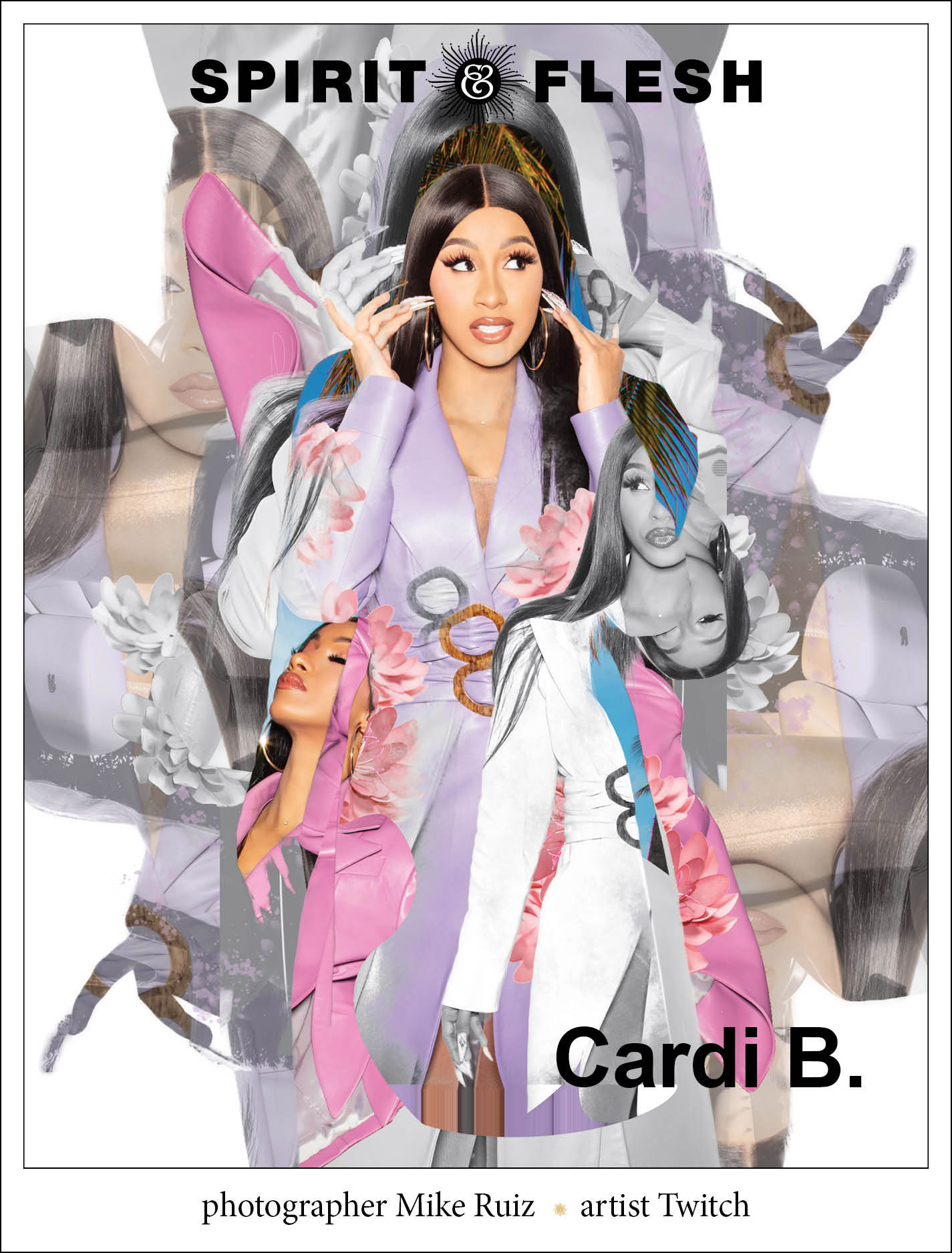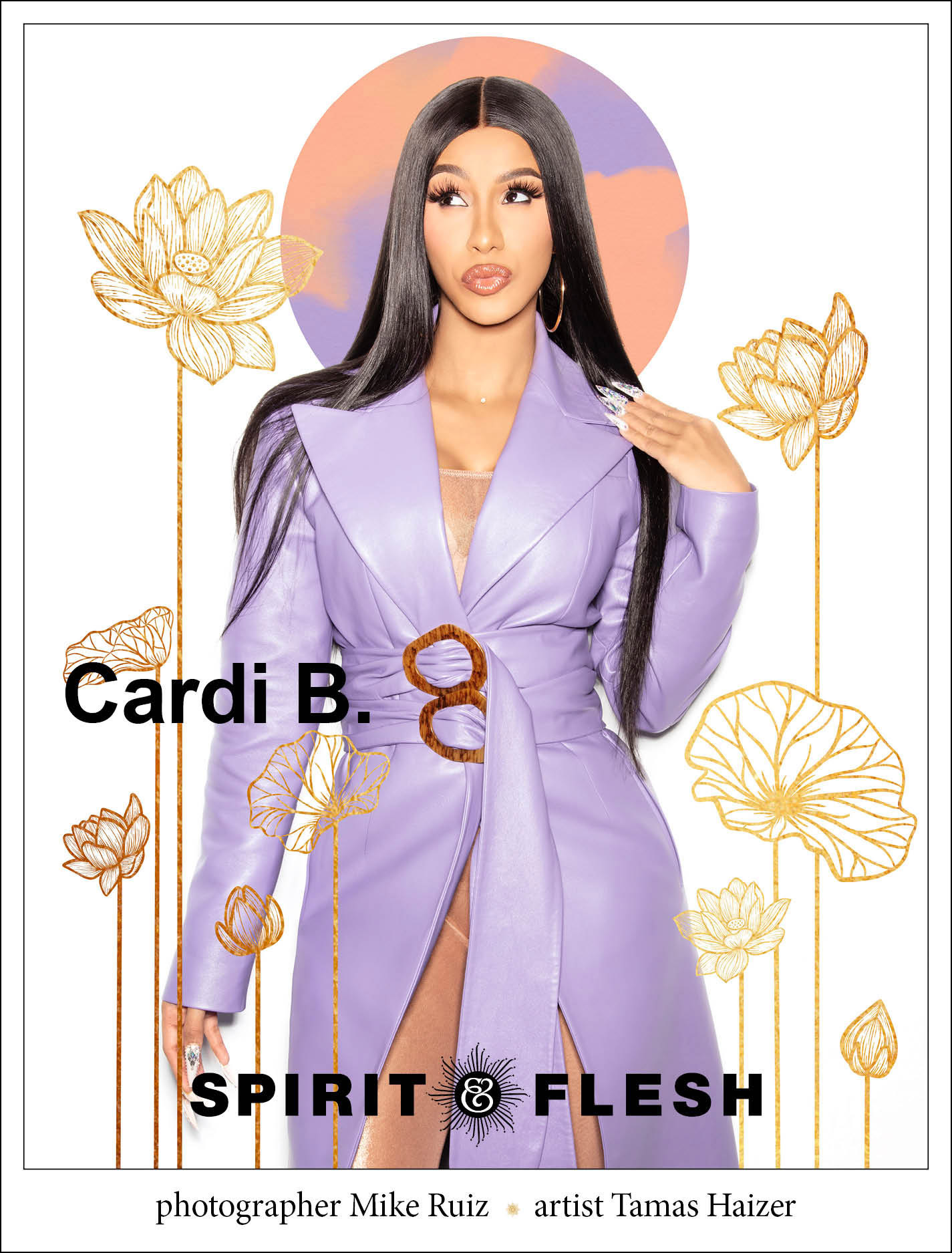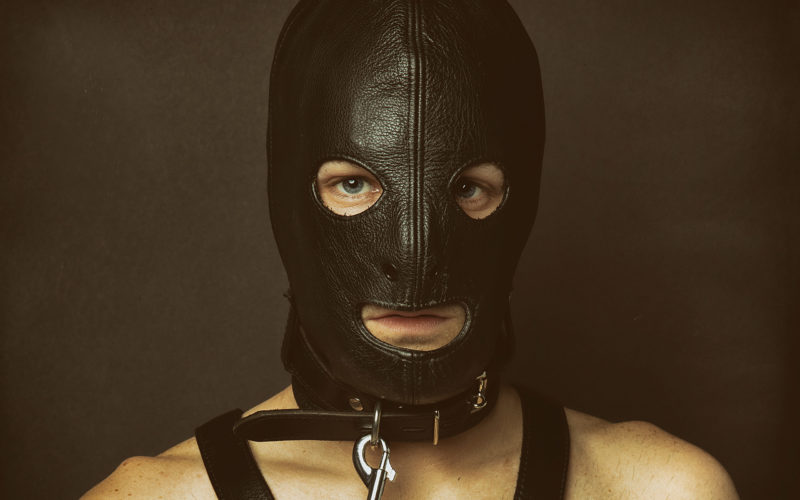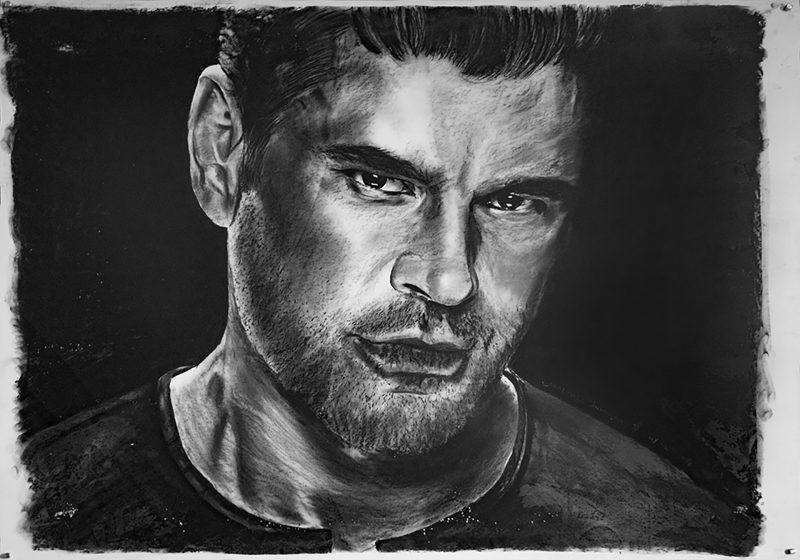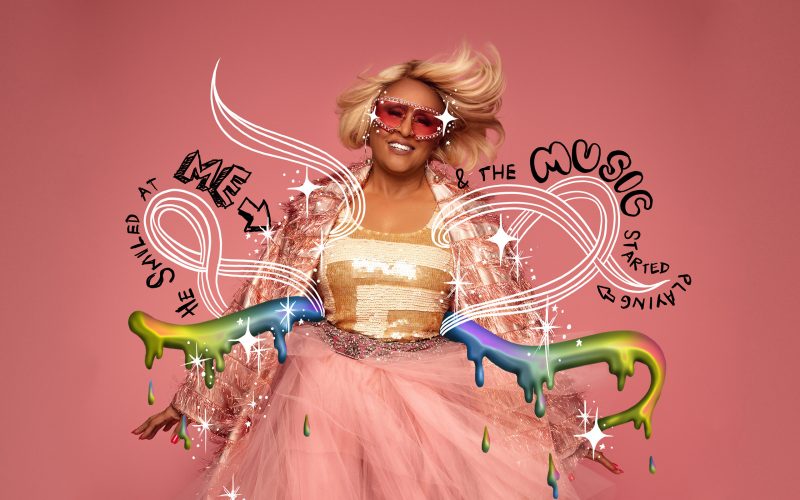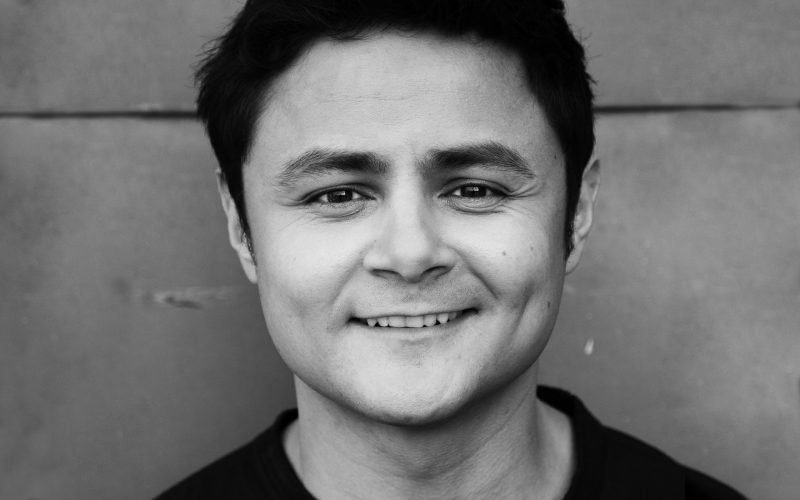article by JOSHUA GOLDFOND
photography by MIKE RUIZ
artists:
EMIL MITEV
GUILLERMO HUERTA PORRAS
TAMAS HAIZER
TWITCH
starring CARDI B
With her outsized personality and prodigious talent, Cardi B (born Belcalis Marlenis Almánzar) looms large in the media sphere of 2021. Like any celebrity worth their salt, she bears many faces and occupies many roles in the public imagination. We’ll take a look at some of them in this article, in accompaniment of a recent photoshoot conducted by celebrated photographer Mike Ruiz, enhanced and altered by artists. In sum, it showcases Cardi B’s unique energy and aesthetic.
The Social Media Maven
In its earliest days, the internet generated memes and curiosities, but never stars. The Chocolate Rain Guy and the Star Wars Lightsaber Kid here for a day and gone in a flash. It wasn’t until the 2010s—with the growth of Tube, Vine, Twitter, TikTok, and Instagram—that the center of gravity shifted. The “Internet Famous” became “Social Media Influencers,” and the web became a stellar nursery. Stars were born. Some were minor, emerging from the medium to carve out a profitable niche (yoga instruction, performative pimple-popping, Alt-Right conspiracy theories). Others, like Kim Kardashian and Lady Gaga, used social media to develop their already-growing public personas into supergiants. Only a very rare few have emerged from total internet obscurity to achieve crossover mainstream success.
As an unknown, Cardi B wielded her social media tools adroitly, using a winning combination of humor, vulgarity, and candor to craft a persona more compelling than the safe and manicured personas of more famous figures. Among other things, she spoke frankly about sex, poverty, politics, plastic surgery, her personal history, her family, and her ambitions as a hip-hop artist. In 2015, her online popularity led her to the cast of the VH1’s Love & Hip-Hop: New York. Much as her personality proved too large to be contained by the internet, it would soon burst the seams of the small screen. She left the show in 2017 to focus on her music career, releasing two best-selling mix tapes before signing with Atlantic Records.
Now a global celebrity and household name, social media remains core to her brand. She posts frequently through her Instagram account, engaging her 90-plus million followers with the same candor and humor that she did back in her Influencer days. If there’s a professional team tasked with Cardi B’s social media, they know better than to mess with success. As her Instagram bio notes, she has a “GRAMMY-WINNING VAGINA.”
The Hip-Hop Upstart
Cardi B’s lucrative contract with Atlantic Records soon paid dividends, with the 2018 release of her Grammy-winning, multi-platinum debut album, Invasion of Privacy. The work is the apotheosis of her online persona: provocative and profane, aggressive and celebratory, unfiltered and personal. Invasion of Privacy earned rave reviews from publications as mainstream and broad as Entertainment Weekly, to ones as discerning and unpredictable as Pitchfork. It was highlighted on dozens of lists for best albums of the year, and later for best albums of the decade. Its principal single, Bodak Yellow, became the first song to ever receive diamond certification by a female rapper. Invasion of Privacy has since become the most-streamed album by a female rapper on Spotify, as well as the longest-charting album of all time by a female rapper on the Billboard 200. She was on Time magazine’s 100 most influential people of 2018, and 2020 saw her named “Woman of the Year” by Billboard.
Such achievements in such a short time seem almost hyperbolic. It’s not how things are supposed to happen. Online personalities and reality TV stars are meant to release novelty songs, appear on Celebrity Big Brother, and then fade out. Maybe they’ll resurface in a nostalgic Superbowl ad ten to twenty years later. And yet, as Cardi B herself notes in the song, “I Do”:
“They said by now that I’d be finished, hard to tell (I can tell) / My little fifteen minutes lasting long as hell, huh?”
While her second album is on the way, she’s released dozens of singles and collaborated with some of the most popular names in hip-hop. Among these was the 2020 single “WAP” with Megan Thee Stallion. You might remember this as the song that first made your mother aware of Cardi B.
The Feminist Provocateur
Pop music has always pushed the boundaries of sexuality. Your grandmother screamed for The Beatles, your parents hooked to Prince, and you yourself have been spotted dirty dancing to Lady Gaga at the club with your friends. Elvis was thrusting his hips against a microphone stand long before Cardi B received simulated cunnilingus on the cover of her first mix-tape. But it’s all part of the same cultural continuum. Every few years, the music industry turns out a boundary-breaching, sexually-charged cultural event that redraws the lines of permissibility. Everyone is forced to look inward and decide if they are still Young, or if they are finally—comfortably—Old. In 2020, this event was Cardi B’s “Wet-Ass Pussy.”
For the Young, “WAP” is an exciting, hard-charging, and often hilarious anthem for voracious feminist sexuality, with a beat you could dance to. Cardi B talks in graphic terms and clever metaphors about her desire for sexual gratification, her expertise at fellatio, and her ability to use sex to bend men to her will. It is empowerment by sexual prowess; as direct and unapologetic as anything ever sung by Dion, The Rolling Stones, or Jay-Z. In WAP, Cardi B intones that, “I let him taste it, now he diabetic.” The fate of the man from the mix tape cover is unclear.
For the Olds, WAP is a sign of the world moving away; too fast and too far for them to catch. There’s no shame in this; every generation dances to its own beat. Naturally, the cultural scolds complained. This is their wont. Some even went a little mad. Overripe conservative wunderkind Ben Shapiro attacked the lyrics of WAP with the fury of a man thrice his age, citing his wife’s explanation that vaginas that became too moist had infections. He chose to believe this. The implications of being told this by one’s spouse were too much to fathom.
And so, a new frontier opened in the world of sexual expression in pop culture. For some, there was liberation. For others, there was only terror; cold and dry as a desert’s night.
The Political Firebrand
From her earliest days on social media, Cardi B has spoken openly about public and political issues. It’s common enough for showbusiness figures to express liberal viewpoints on identity and representation (gender, race, sexuality) but much rarer for them to discuss class and structural injustice in the United States. Cardi B has an unabashedly Leftist perspective, rooted in her life experiences with poverty and of being a POC in the 21st century America where Republicans fret about “economic hordes at the southern border” and “white genocide.”
She’s praised FDR’s “New Deal” and LBJ’s “Great Society,” while criticizing the Trump administration writ large. She protested the US military’s extrajudicial killing of Iranian General Qasem Soleimani in 2020; an act which even ostensibly liberal news outlets largely framed as ugly-but-necessary. She demanded that the government provide an accurate accounting of how her tax money is being spent, citing such malfunctioning systems as the prison-industrial-complex and the NYC MTA. She even declined to perform at the Superbowl, turning down a significant payday, as a sign of support for Colin Kaepernick and Black Lives Matter.
Cardi B was also one of the most prominent and outspoken supporters of Bernie Sanders in the 2020 Democratic primary, arguing that he was the only candidate who expressed any concern for the plight of the poor and the depredations of the ultra-wealthy. This led to one of the more surreal and charming moments of the election cycle when Bernie Sanders tweeted a video thanking Cardi B for emphasizing the importance of the Social Security program. Taken in total, she uses her platform to voice the growing concerns that Millennials and Gen-Z have about material conditions and a political system that no longer pretends to work for them. It would be simple enough to conclude that she’s “remembering her roots” while living the posh superstar lifestyle, but her persistence on these issues is a bellwether of our times. The class awareness that started to take hold with the 99% movement, in the early 2010s, hasn’t quite abated.
The Doting Mother
Following the surprise announcement of her pregnancy on Saturday Night Live, Cardi B has embraced her parental role in social media and in the public eye. A now-famous photograph of the naked, artfully-covered, and extremely pregnant mother-to-be appeared on Instagram, in advance of the 2018 birth of her daughter, Kulture. The child has since become a fixture on Instagram and YouTube, playing a prominent role in the rich tapestry of the rapper’s life. Images of mother and daughter abound: sporting fashion, traveling, or in one YouTube video, showing the results of the two-year-old’s attempt at doing her mom’s makeup.
Cardi B’s relationship with the child’s father, husband “Offset” of the rap trio Migos, has been fraught with drama since its start in 2017. His infidelities, their separation, reconciliation, divorce proceedings, and recent re-reconciliation have kept the tabloids brimming with content. But at no point has any of the controversy reflected on her ability and commitment as a mother. If anything, being a parent has sharpened her political and social voice, as the idea of creating a better world has taken on greater urgency.
As is the case in patriarchal cultures the world over, Americans tend to see feminine lust as standing in opposition to the traits of responsible parenthood. Not so for men, of course, where fertility equals virility; even proof of sexual prowess. Cardi B’s insistence on simultaneously presenting both familial care and sexual lust—her refusal to compromise or tone down either part of that human whole—is a somewhat revolutionary act for any pop culture diva.
It’s important to remember that WAP was the work of a MILF.
The Fashionista
There’s no point in being a music diva if you’re not going to cultivate your own style. Cardi B has worn and modeled a wildly eclectic wardrobe for music videos, red carpets, magazine covers, and social media: a black, wide-legged jumpsuit for the BET Hip-Hop Awards; a “Venus on the Half-Shell” Thierry Mugler gown at the Grammys; a pink latex ensemble; a cape and oversized glasses for VH1’s Love & Hip-Hop; a seafoam ballgown for Rihanna’s Diamond Ball. Her Instagram account casts an even broader net, where images of hyper-sexualized outfits intersperse with ones of her wearing sweatpants and a hoodie at home. Cardi B began a partnership with Fashion Nova during her time as an influencer, and it continues through today with her own “Fashion Nova X Cardi B” line.
More possibilities are on the horizon.

